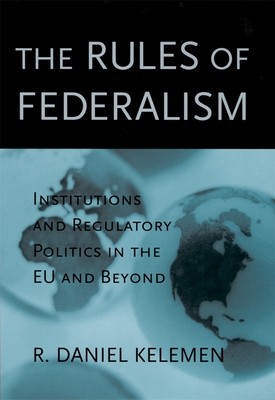
- We will send in 10–14 business days.
- Author: R Daniel Kelemen
- Publisher: Harvard University Press
- Year: 2004
- ISBN-10: 0674013093
- ISBN-13: 9780674013094
- Format: 16.8 x 24.5 x 2.2 cm, hardcover
- Language: English
- SAVE -10% with code: EXTRA
Reviews
Description
This book examines patterns of environmental regulation in the European Union and four federal polities--the United States, Germany, Australia, and Canada. Daniel Kelemen develops a theory of regulatory federalism based on his comparative study, arguing that the greater the fragmentation of power at the federal level, the less discretion is allotted to component states. Kelemen's analysis offers a novel perspective on the EU and demonstrates that the EU already acts as a federal polity in the regulatory arena.
In The Rules of Federalism, Kelemen shows that both the structure of the EU's institutions and the control these institutions exert over member states closely resemble the American federal system, with its separation of powers, large number of veto points, and highly detailed, judicially enforceable legislation. In the EU, as in the United States, a high degree of fragmentation in the central government yields a low degree of discretion for member states when it comes to implementing regulatory statutes.
EXTRA 10 % discount with code: EXTRA
The promotion ends in 20d.14:38:20
The discount code is valid when purchasing from 10 €. Discounts do not stack.
- Author: R Daniel Kelemen
- Publisher: Harvard University Press
- Year: 2004
- ISBN-10: 0674013093
- ISBN-13: 9780674013094
- Format: 16.8 x 24.5 x 2.2 cm, hardcover
- Language: English English
This book examines patterns of environmental regulation in the European Union and four federal polities--the United States, Germany, Australia, and Canada. Daniel Kelemen develops a theory of regulatory federalism based on his comparative study, arguing that the greater the fragmentation of power at the federal level, the less discretion is allotted to component states. Kelemen's analysis offers a novel perspective on the EU and demonstrates that the EU already acts as a federal polity in the regulatory arena.
In The Rules of Federalism, Kelemen shows that both the structure of the EU's institutions and the control these institutions exert over member states closely resemble the American federal system, with its separation of powers, large number of veto points, and highly detailed, judicially enforceable legislation. In the EU, as in the United States, a high degree of fragmentation in the central government yields a low degree of discretion for member states when it comes to implementing regulatory statutes.


Reviews